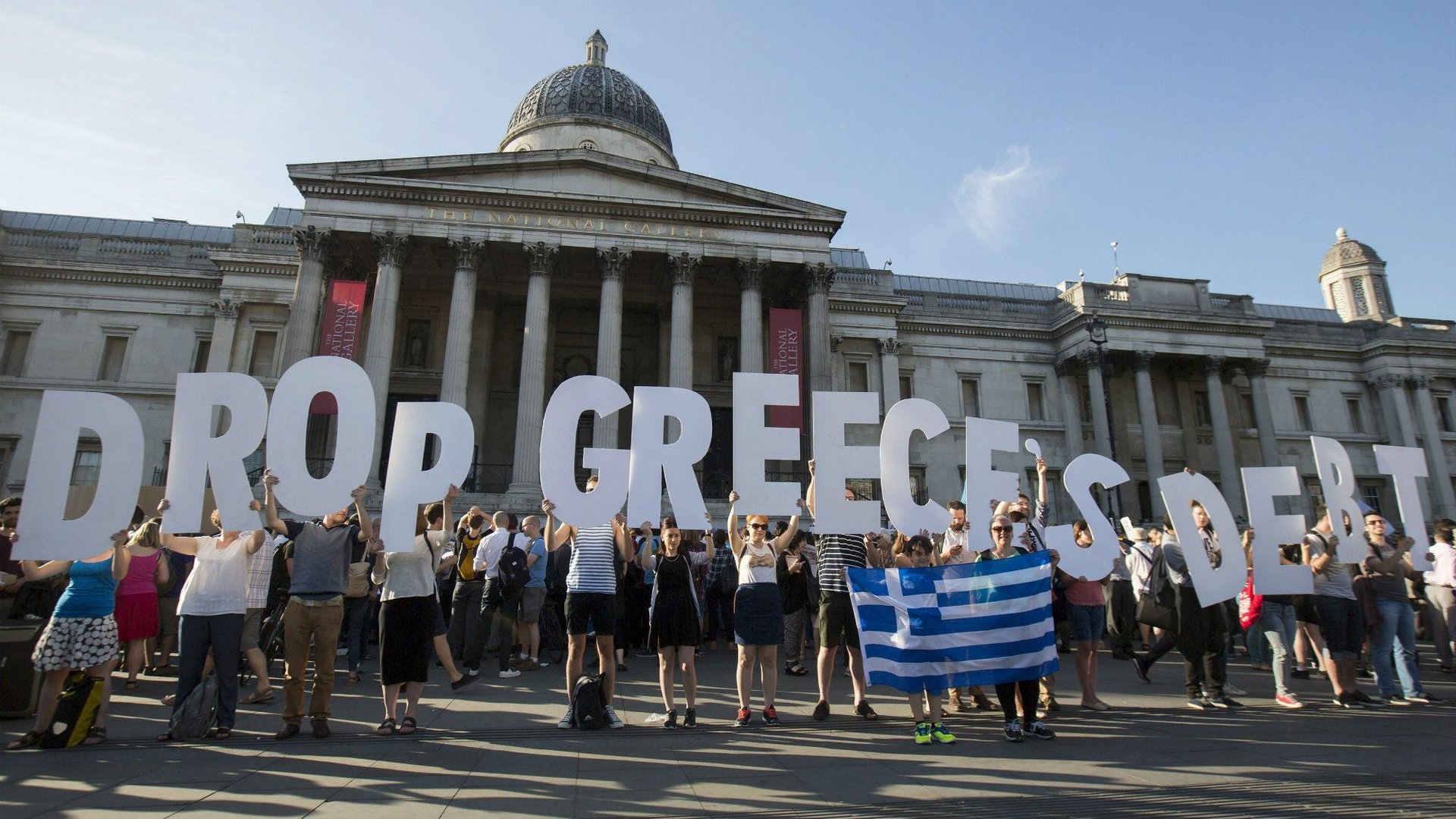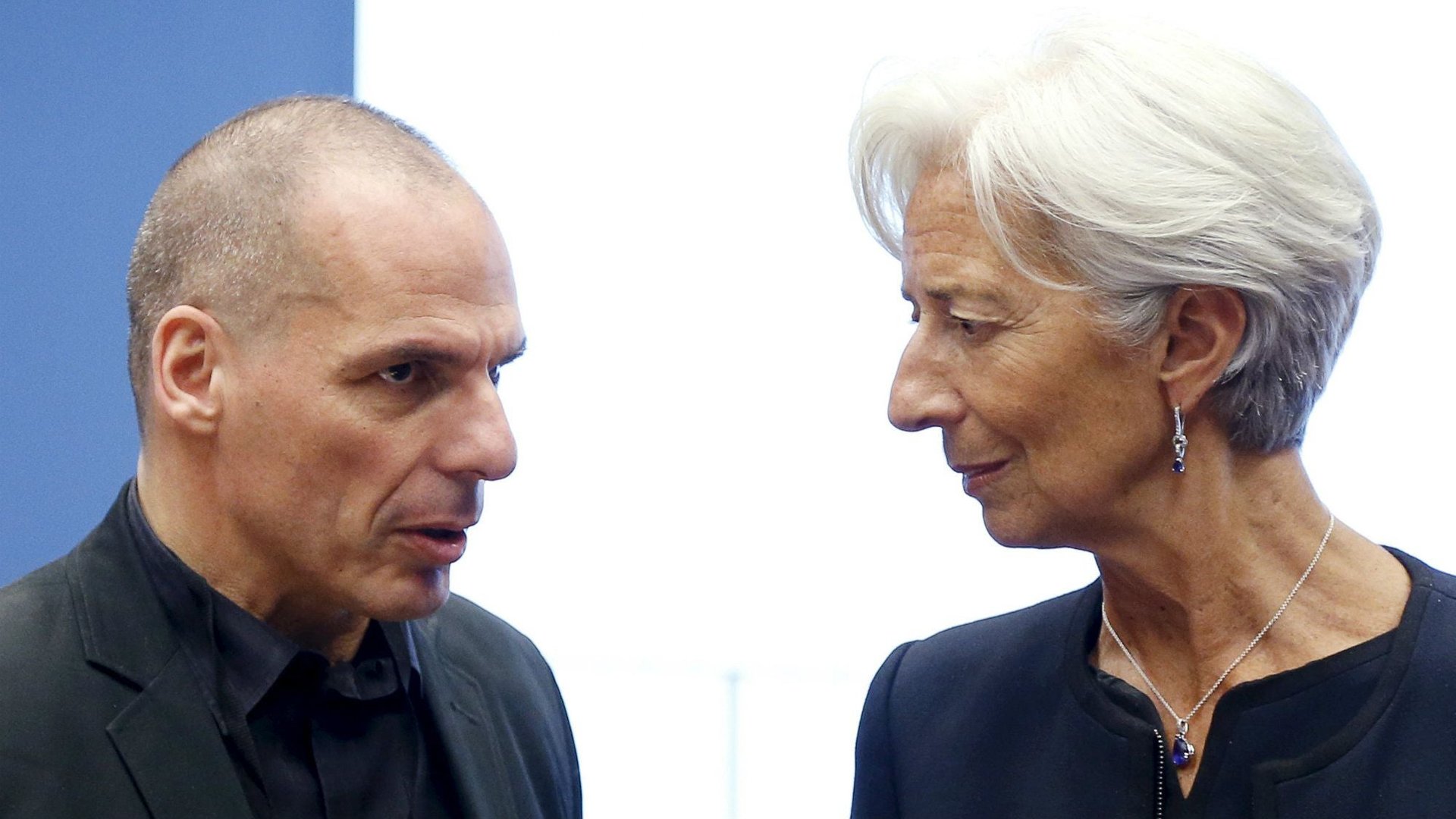The IMF has made an obvious point about Greece’s huge debt. Here’s why it still matters
Are you sitting down? The International Monetary Fund has dropped a bombshell: Greece has too much debt.


Are you sitting down? The International Monetary Fund has dropped a bombshell: Greece has too much debt.
Pretty obvious, right? After all, Greece missed a loan payment to the IMF itself earlier this week. But this is a pretty big deal, if you can believe it.
The fund published a draft of its latest analysis of Greece’s public debt yesterday, detailing a litany of factors that “render the debt dynamics unsustainable.” That’s a bureaucratic way of saying that there’s no chance that the country’s lenders will ever be repaid in full.
The IMF reckons that in addition to needing a new three-year bailout worth some €60 billion ($67 billion), Greece should have the maturities on its existing loans doubled, from 20 to 40 years. And that’s under relatively rosy economic assumptions—if things keep going like they’re going (down), the only way to give Greece a fighting chance at repaying its loans is to extend maturities as well as write off a significant chunk of its debt. A “haircut” worth a mere €53 billion ($59 billion) would do it, the IMF says.
Restating the obvious
To date, the IMF has not publicly spelled out its unease with Greece’s overwhelming debts in such detail. However, the forecasts included in the report also appear, in abridged form, in one of the documents (pdf) that Greeks will vote on in a referendum this weekend.
The IMF’s forecast is considerably gloomier than those from euro zone creditors (who provide far more of the funds in Greece’s bailout deals than the IMF) in the document. For that reason, the fund notes that a “significant reprofiling” of Greece’s loans—in other words, extending maturities—is needed to bring the debts down.
Last month, the IMF’s chief economist said much the same thing, although it didn’t carry as much weight since it came in the form of a personal blog post rather than an official report. And for what it’s worth, former IMF chief Dominique Strauss-Kahn, who was in charge during Greece’s first bailout, recently published a note—“On learning from one’s mistakes”—that also calls for a restructuring of Greece’s debt.
Greece’s euro zone lenders said in late 2012 (pdf) that they would consider “further measures and assistance” to reduce the country’s debt burden, provided that Athens stuck to agreed reforms. Earlier that year, Greece wrote down the value of bonds issued to private-sector lenders by some €100 billion, which put a big dent in its relative debt burden at the time, but quickly reversed. (It also blew up banks in Cyprus and pushed that country into a bailout of its own.)
Despite a few tweaks and extensions to Greece’s bailout funds since then, the country’s sickly economy has kept its debt burden—currently almost 180% of GDP—well above the upper limit of what lenders consider sustainable (roughly 120% of GDP):
That’s what set the stage for today’s showdown between Greece’s newish government and its creditors. The government, led by prime minister Alexis Tsipras, demands further debt relief, as previously suggested by its euro zone partners and now acknowledged by the IMF.
But creditors weren’t keen to entertain a debt restructuring during Greece’s latest negotiations, which were focused on a second five-month extension of the country’s now-lapsed second bailout program. Before Tsipras called a referendum on an earlier proposal from creditors, lenders said they were close to a deal on an extension both sides could live with, as well as steps toward a third multi-year bailout agreement that would likely feature debt restructuring. (I know, I know—stay with me here.)
A sweet and sour deal
As Greece’s creditors are eager to stress, the country’s bailout loans, as big as they are, benefit from incredibly generous terms. They are “by far the most favorable lending conditions ever granted” to a country by the euro zone’s rescue fund, it says. Indeed, it costs less for Greece to service its debt than most of the other “PIIGS” in the euro zone’s troubled periphery:
And, as the think tank Bruegel explains, since some quirky features of Greece’s bailout loans aren’t captured by official statistics, the effective cost of servicing Greece’s debt is closer to France and Germany than Italy or Portugal. So why is debt restructuring such a seemingly urgent issue?
For one thing, the sheer size of the country’s debt means that favorable interest rates and lenient repayment schedules still aren’t enough to make bills small enough for the cash-strapped state to pay. Greece’s annual financing needs are currently running at around 25% of GDP, well above the IMF’s recommended limit of 15%.

More importantly, the austerity measures (tax hikes and spending cuts) that lenders made Greece impose in return for bailout funds have savaged its economy (pdf). Before he became finance minister, Yanis Varoufakis described these conditions as akin to “fiscal waterboarding.”
Over the past five years, Greece has cut its fiscal deficit further and faster than just about any other country, ever. The wrenching effect on the economy has pushed unemployment to dizzying heights and drained the government’s resources, making all manner of debt service difficult. Even so, creditors are also quick to note that government foot-dragging on reforms—namely, improving tax collection—and privatizations haven’t helped Greece’s case either.
Whatever the case, more austerity alone won’t fix things—a big and decisive debt restructuring is crucial to putting Greece’s fiscal house back in order.
The blame game
This is why the IMF’s public, official acknowledgement that debt relief is needed is newsworthy. Until now, the fund’s forecasts of Greece’s debt dynamics have been fanciful:
All of the key players in the bailout negotiations now believe, to varying degrees, that debt restructuring is needed. This is not to say that including a writedown in a future bailout will be easy—after all, if Greeks vote to reject the (now expired) bailout conditions in the referendum, all bets on more aid are off.
If the Greeks and its lenders are still talking to each other next week, the IMF’s analysis will significantly alter the tone of the discussion. Throughout Greece’s bailout drama, euro zone creditors have relied on the IMF for its expertise and guidance as much as its financial capacity. This led the fund to be denounced as a toady to euro hardliners, bullied into going against its own advice by approving a series of doomed rescue programs.
Now that the IMF has owned up to the unsustainability of Greece’s current path, there is hope that it will use its clout to finally put an end to this sorry saga. That is, if it gets another chance.